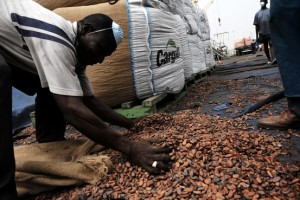For all of you chocolate lovers out there beware: there may be a flaw in Western chocolate manufacturers’ supply chain management of cocoa. Productivity is not at the levels it needs to be to satisfy manufacturers and consumers. To better put this into perspective, Mars has found that if the levels of productivity remain the same as today, by the year 2020 there would be a shortage of 1.1 million tons of cocoa. If this occurs and current productivity levels of cocoa trended into the future, the cocoa farming business will not be headed in a promising direction.
The disconnect lies within cocoa faming itself. There is little incentive for cocoa farmers to continue in their line of work because of the competitive rubber industry. It is considered a less uncertain industry with a longer crop season by about four months. On top of this, the wage for both types of farming is roughly the same.
The other constraint of the industry is the high risk for disease outbursts. This is partly due to the inadequate access of much needed fertilizers for the cocoa crop.
Cocoa-farmers do not come anywhere near the crop’s capacity since their utilization is only around 60%. Cocoa manufactures have recognized the scarcity as a sincere problem since in many growing areas more than 40% of the cocoa crop is destroyed due to vermin and disease. One would hope that this type of scarcity could be due to assignable variation that can be improved by subtracting bad causes.
How would you react if chocolate turned into a luxury good instead of an affordable snack due to flaws in the supply chain management?
Chocolate manufacturers are looking to provide solutions for productivity in the cocoa-farming realm. Many companies like Mondelez and Mars have invested millions in education programs in hopes to increase productivity and decrease disease-ridden crop. Mondelez has gone as far as hiring students from universities for these cocoa programs to target efforts toward younger generations. This seems to be an efficient approach, given the fact that peer motivation is a convincing form of motivation.
Another potential solution was Ivory Coast’s decision to set a price minimum for cocoa. This was an astonishing action that stresses how essential cocoa farmers are in the industry.
It is hard to believe that the issue has gone this far. In my opinion, action should have been taken much sooner. The uphill battle is much worse now that efficiency levels have sunk so far below maximum capacity.
Do you think that these efforts put forth by chocolate manufacturers will be enough to save the chocolate industry?
What else can be done to improve the supply chain management and productivity in the industry?
Have you noticed any other flaws in the cocoa/chocolate industry besides the supply chain management?
Which action will have a greater affect on the industry: a price minimum or cocoa farming education programs?

I certainly hope that the cocoa issues are figured out before a shortage occurs. I cannot imagine chocolate being a luxury instead of an everyday indulgence. Chocolate is very popular in my household and we enjoy baking with chocolate, so our weekly routine would be greatly altered by a change in price.
I think the educational programs and a price minimum are a step in the right direction. Overall, I see the educational and research programs creating the most benefit because they can lead to changes in farming, fertilizer control, and strategy. Researching ways to increase stability and reduce destroyed cocoa may be enough to keep the shortage at bay, at least for the next few years.
It seems that all supply chains face a crisis at one time or another. Just think about the major disruptions to supply chains as a result of catastrophic events like Hurricane Katrina or the earthquake in Japan. These are unpredictable events that can destroy supply chains and corporate profitability for long periods of time.
Chocolate manufacturers at least have one thing going for them. They know what their supply chain crisis is well in advance. This is something they can proactively influence and change. It sounds like some companies are already well on their way to educating the appropriate parties about potential cocoa farming shortages. I wouldn’t be surprised if vertical integration is a strategy used by major chocolate manufacturers if the education process isn’t as successful as desired. Chocolate manufacutuers would then be in the business of cocoa farming and could protect their interests.
Thanks for sharing this. This would be a big help but I think writing an essay for college application
needs only determination. If you are determined enough to enter college.
Moira Beauty Glow Getter Hydrating Lip Oil